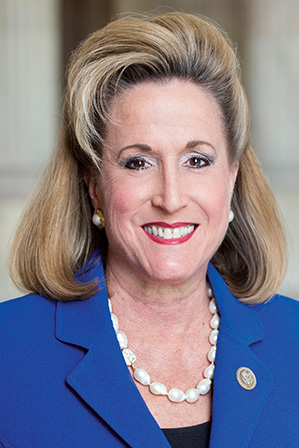Support Our Diplomats to Maintain U.S. Leadership
A Message from the Hill
BY REPRESENTATIVE ANN WAGNER

The United States faces a range of serious challenges, including humanitarian crises of unprecedented scale, rising authoritarianism around the world and transnational criminal networks. Rivals like China and Russia exploit rising instability to undermine democratic values and respect for human rights.
In this uncertain threat environment, U.S. diplomacy is more important than ever. As a former ambassador, I know firsthand that U.S. priorities such as safeguarding human rights, fostering peace, and promoting economic development and good governance are simply not possible without a capable and resolute diplomatic corps. In the coming years, we will increasingly rely on you—our Foreign Service officers and specialists in embassies, posts and consulates around the world—to navigate a complex and unpredictable international system.
Some, however, question the necessity of robust U.S. leadership. Correspondingly, funding for the State Department and U.S. Agency for International Development has been deemphasized. This is misguided. To paraphrase the oft-quoted General James Mattis: if we don’t fund the State Department, we must buy more bullets.
One of my top priorities in Congress is to make sure that you have the resources you need to accomplish your mission— and I know that most of my colleagues on both sides of the aisle would agree. In March, I testified before the State and Foreign Operations Subcommittee of the House Appropriations Committee to advocate for robust funding for the State Department and USAID.
In my testimony, I outlined a few spaces in which congressional support can have a special impact. The first of these is in the area of preventing complex crises.
Preventing Complex Crises
Peace and stability are prerequisites for prosperity. But as we see in Syria, Burma and elsewhere, many states are engaged in large-scale violence against their own citizens. The humanitarian crises these conflicts have spawned have ripple effects that can destabilize whole regions.
The Department of State has tools to mount flexible, efficient response efforts on the front end of an evolving crisis. For example, the Complex Crises Fund is a critical global account that enables the United States to respond swiftly and efficiently to unforeseen crises, filling a gap when other monies are unavailable.
U.S. Foreign Service officers and USAID workers in the field rely on the CCF to mitigate incipient humanitarian crises and prevent complex conflicts from spinning out of control. Data analysis from the Institute for Economics and Peace indicates that strong funding for the CCF could actually save taxpayer money in the long run: if countries in conflict received increased funding for peacebuilding activities, the cost of conflict would be reduced by 16 dollars for each dollar invested in early peacebuilding.
Ending Human Trafficking
Ending the scourge of human trafficking is a task that requires extensive cooperation among all members of the international community. The State Department’s Office to Monitor and Combat Trafficking in Persons (known as the TIP Office) has been instrumental in building partner-nation capacity and providing incentives for the implementation of effective anti-trafficking measures worldwide.
That office also researches the annual Trafficking in Persons Report, a diplomatic tool that has contributed to significant improvement in many countries. USAID’s anti-trafficking programs protect marginalized communities that are especially vulnerable to labor and sexual exploitation. They also integrate activities to counter trafficking in persons into broader U.S. development programs.
Each of these anti-trafficking programs makes a unique, significant and complementary contribution to reducing slavery and trafficking and to assisting those who are victimized. The programs help countries protect child and adult victims, prosecute and deter perpetrators, and prevent slavery from taking root in vulnerable communities.
It is critical that we also work harder to reduce demand for commercial sex by holding buyers accountable and fight online sex trafficking and sexual exploitation. What is illegal offline must also be illegal online. Through my Fight Online Sex Trafficking Act (FOSTA), H.R. 1865, which became law in April 2018, Congress took steps to hold accountable online businesses that facilitate trafficking and prostitution.
This is a global fight, however, and we must work with partners to ensure that no country enables online trafficking.
Remaining a Reliable Partner
America excels at helping our partners build capacity, good governance practices and democratic institutions. And countries around the world want—and need— us to remain a reliable partner.
I believe there is a bipartisan consensus in Congress that understands how important the Foreign Service is in achieving these goals. We support your mission and will ensure you have the tools you need to advance our priorities and safeguard our interests abroad.
Together, we are more than capable of overcoming the challenges we face. I thank you for your service and your dedication to our country.


